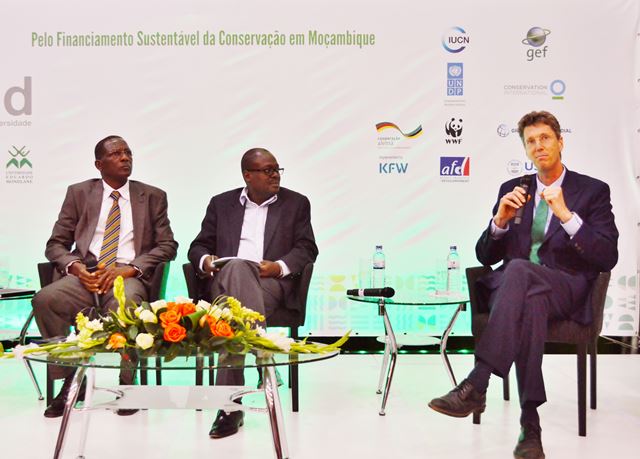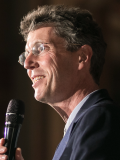When Adam Smith released his "Inquiry into the Nature and Causes of the Wealth of Nations" in 1776 he and his contemporaries were just beginning to get a glimpse of how industrialization and productivity gains would forever change our lives. What he intuited - but was far too ahead of his time to realize - is that the basis of wealth came from our inherited endowments, and their ability to produce income, jobs and prosperity into the future depends very much on how these resources are stewarded and managed.
Nowhere is this more clear than in the case of extractive industries or those that benefit from unseen and often undervalued ecosystem services, such as forestry, agriculture, or fisheries. As with many well endowed frontier economies, wealth was at our fingertips - and we harvested. Particularly in my country - the United States - with a seemingly endless frontier of resources, the idea grew that if you worked hard and fast enough, prosperity was within reach.
Yet much of the wealth - or more precisely, economic growth - produced by liquidating the frontier resources was an illusion. Because rather than creating value or new sources of wealth, much of what happened was merely liquidating one form of wealth for another - say, natural capital for physical or financial capital. With our relentless focus on GDP growth and current income we often missed the big picture of how our larger portfolio of wealth and assets were being stewarded and managed.
UNEP recently released its report on Inclusive Wealth Accounting, which measures overall stocks of wealth and how they are managed. It provided some very sobering data: some countries, such as Nigeria, are growing at high rates of GDP; but are decreasing overall wealth. Some, like China, are growing at high rates, depleting natural capital but reinvesting in human and physical capital to increase overall wealth. So, whether growth is an illusion or is actually contributing to inclusive wealth depends on the quality of growth and how the capital stocks are being reinvested as natural capital is drawn down.
 Zoom to Mozambique
Zoom to Mozambique
I had the privilege to visit Mozambique in early June to witness the launch of a new conservation fund by the President of Mozambique and many other distinguished guests called the Biofund.
A relatively young nation celebrating 40 years of independence in 2015, Mozambique is well endowed with natural wealth. And the role of extractives in producing economic growth is still quite large - it is a primary economy with almost 40 percent of its GDP deriving from mining, agriculture, fisheries and forests.
Given its stocks of natural capital, Mozambique is a wealthy country. But, as I was surprised to learn, it is also one of the poorest in terms of per capita GDP and human development indices at USD 600/per capita per year; and 178 out of 187, respectively, in terms of global ranking.
So, the imperative is on growing income, and the question is how to tap that natural wealth and convert it into better livelihoods and quality of life for its people. The question is how to grow inclusively, creating new jobs and employment, and creating the skill sets needed for a post-extractive economy. And the question is how to do this in a sustainable manner, so that growth is not an illusion.
Enter the Biofund, a financial mechanism for ensuring that key natural areas in Mozambique are maintained in perpetuity.
Let us not underestimate the value of these natural areas or their contributions to the economy and wealth portfolio of the country. As a largely rural country reliant on farming, the water provisioning and ecosystem services provided by natural areas is huge - and usually, largely unseen. As Pavan Sukhdev, Study Leader of the Economics of Ecosystems and Biodiversity or TEEB has said, it is the "economic invisibility of nature" that leads us to often undervalue or underestimate the true contributions of services to our economy and well-being.
The Biofund will ensure that these key natural areas will continue providing ecosystem and biodiversity services well into the future, underpinning a strategy of wise use of natural resources and a rational approach to converting Mozambique's extraordinary endowment of natural wealth into greater human well-being and sustained and inclusive economic growth.
Mozambique’s Green Growth Strategy
And here, I am comforted by knowing that Mozambique, with its key partners like the African Development Bank, WWF, UNEP and others, has developed and refined a strong roadmap and strategy for making its economy green and inclusive. Not overnight. Not by freezing investment or blocking access to its mineral resources. But by putting the wise use and value that can be derived from exploiting them into a wider plan for creating sustainability into the long term, and a roadmap for managing what the ILO has called a “just transition”.
Embarking on this transition requires courage, leadership and vision. The newly created and approved Five Year Plan marks a good step forward, highlighting the role of sustainable use of natural resources and linking back to the green economy roadmap and strategy.
And, the Biofund can play a key part in this wealth management strategy. Since it is geared towards maintaining the integrity and good functioning of key natural sites in the country, it can be seen as a "piggy bank" for natural capital. A vehicle for ensuring that ecosystem services and biodiversity are conserved and contributing to human well-being and the economy well into the future.
As key mineral and renewable natural resources are used and drawn down, the Biofund can become a way to ensure that the savings and overall stock of wealth is not depleted, but rather reinvested in securing other forms of natural capital. In other words, it can become a transfer vehicle or hedging device to ensure that windfall gains from natural resource use are not lost, but reinvested. That economic growth does not become just an illusion.
For example, it is easily conceivable that in auctioning off access to new natural gas or mineral resources, a small fraction of the royalties - and I am talking about a fraction of a percent - are folded back into the Biofund to ensure that current windfalls are also put to work securing the future sustainability of key ecosystems in the country.

Towards the green economy “faro”
When navigating the waters of economic necessity and growth options, external shocks and pressing domestic needs, it can often seem dark and lonely. Scary even, as the pressing social realities of underemployment, health and educational needs beckon for immediate attention.
But step back and think to the future. Imagine a country like Mozambique – and there are many in this situation - 20 or 30 years from now, when its rich stocks of natural wealth have been mined and depleted. What will it look like? Will its human development needs be met, and will the wealth of the country been well managed, to create a diversified and vibrant economy?
All this depends on how its portfolio of natural wealth is managed. The way in which resource rents and natural wealth is managed will be critical not only to its pace of growth, but its quality of growth.
And here, we can take some encouragement in how Mozambique has defined its vision for development over the next five years, including an anchor in what they call the “green-blue” economy, referring to the management of their rich endowment of marine and coastal resources.
This end state, this vision of a sustainable future and the economy that will deliver it, is the "faro" – Portuguese for a lighthouse on the edge of the ocean, marking the destination and safe harbor.
The nature of wealth - the wealth of nature. These are within reach for Mozambique, and Mozambique can take a leading role on the international stage in showing what leadership looks like in moving beyond an extractive economy - to one that is both green and inclusive.

